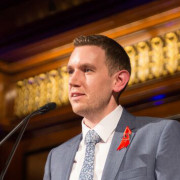Each year on 1 October, people across the world mark UN International Day of Older Persons (IDOP) to raise awareness of opportunities and challenges faced by ageing populations, and to mobilise and address difficulties faced by older people.
People living with HIV deserve to receive effective and stigma free healthcare as they navigate growing older with the virus. Support organisations, healthcare providers and other people who provide support to older persons must listen to the needs of those growing older with HIV. By working together we can empower people to live healthy, empowered lives, and address the isolation, loneliness and internalised stigma that many continue to experience.
Thanks to effective HIV medication, and improved understanding of how to manage HIV long-term, people with the virus are living into later life. The percentage of people living with HIV in the UK aged 50 and over has grown from 25% in 2012, to almost 50% by 2021.
Access to HIV treatment also ensures it cannot be passed on to people’s sexual partners, helping to empower people to address their own anxiety around sex, and internalised HIV-related stigma.
But despite these medical advances, many people growing older with HIV have a number of needs for which they seek support. And in 2021, just over one fifth (21%) of people newly diagnosed were aged 50 and older. Low rates of HIV testing, and late HIV diagnosis can lead to serious health consequences in older adults, with significantly higher mortality rates reported than in any other demographic.
Quote textWe aim to build a supportive community network, providing a space to talk about the experiences of living long-term with HIV.

People growing older with HIV share many problems related to ageing with those who are HIV negative, but many experience common health problems at younger ages, or with more severity and complications, such as managing medications interacting with their HIV treatment.
As well as concerns relating to physical wellbeing, many are anxious about what their future holds, how to manage feelings of social isolation and loneliness, and the prospect of a life reliant on the support of the social care system. Many people growing older with HIV have developed a resilience to HIV-related stigma, but face the prospect of experiencing ignorance and poor understanding of HIV as they become more dependent on support from our health and social care services.
Earlier this year, we invited people growing older with HIV to help shape our ageing services, starting with a series of pilot projects focused on areas of unmet need identified in research we conducted with those already accessing our services. Together we created a series of peer-led activities and workshops to support people improve their physical wellbeing and empower people to explore starting new sexual and romantic relationships. We're also developing an eLearning package to educate people working in the social care sector about the facts about HIV, and what life with HIV means today.
We learnt very quickly in the workshops that older adults with HIV are more than their condition, and many also have concerns about growing older as members of marginalised populations, belonging to LGBTQ+, migrant and Black communities, and experiencing homophobia, transphobia, prejudice or racism, or as women facing heightened sexism as they age.
Our Before 96 group is primarily for people who were diagnosed before or around 1996, when effective treatment started to be introduced, but anyone with long-term HIV is welcome.
We've created a safe space where individuals can discuss the impact of living with HIV before medication was available, and the affect this had on their long-term health, finances and social connectedness, especially those who lost friends and loved ones during the 1980s and early 1990s. We aim to build a supportive community network, providing a space to talk about topical issues alongside the experiences of living long-term with HIV.
This October, we're hosting a series of online workshops to support people to age well with HIV and improve their physical wellbeing. They're open to anyone in the UK living with HIV aged 50 and over.
- Engaging GPs and primary care, Wednesday 4 October at 6pm.
- Eating well for less (in partnership with The Food Chain), Thursday 12 October at 6pm.
- Managing other conditions with HIV and ageing well, Wednesday 25 October at 6pm.
Find out more and register for these events on our groups and workshops page.
Alex Sparrowhawk is HIV and Ageing Manager at Terrence Higgins Trust

